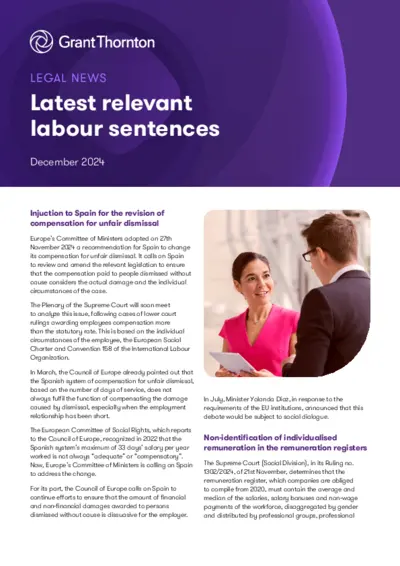
Injunction to Spain for the revision of compensation for unfair dismissal
Europe's Committee of Ministers adopted on 27th November 2024 a recommendation for Spain to change its compensation for unfair dismissal. It calls on Spain to review and amend the relevant legislation to ensure that the compensation paid to people dismissed without cause considers the actual damage and the individual circumstances of the case.
The Plenary of the Supreme Court will soon meet to analyze this issue, following cases of lower court rulings awarding employees compensation more than the statutory rate. This is based on the individual circumstances of the employee, the European Social Charter and Convention 158 of the International Labour Organization.
In March, the Council of Europe already pointed out that the Spanish system of compensation for unfair dismissal, based on the number of days of service, does not always fulfil the function of compensating the damage caused by dismissal, especially when the employment relationship has been short.
The European Committee of Social Rights, which reports to the Council of Europe, recognized in 2022 that the Spanish system's maximum of 33 days' salary per year worked is not always “adequate” or “compensatory”. Now, Europe's Committee of Ministers is calling on Spain to address the change.
For its part, the Council of Europe calls on Spain to continue efforts to ensure that the amount of financial and non-financial damages awarded to persons dismissed without cause is dissuasive for the employer.
In July, Minister Yolanda Díaz, in response to the requirements of the EU institutions, announced that this debate would be subject to social dialogue.

Non-identification of individualised remuneration in the remuneration registers
The Supreme Court (Social Division), in its Ruling no. 1302/2024, of 21st November, determines that the remuneration register, which companies are obliged to compile from 2020, must contain the average and median of the salaries, salary bonuses and non-wage payments of the workforce, disaggregated by gender and distributed by professional groups, professional categories or jobs of equal or equal value. However, it cannot show individual salaries, as the regulations applicable to the register (art. 28.2 of the E.T. and art. 5 of RD 902/2020) foresee the obligation regarding average values and medians, but not regarding the individual salaries of the employees.
This ruling resolves a lawsuit filed by several trade unions, requesting the company to provide all the specific salary data, even for professional groups or jobs in which there was only one employee.
In the case in question, the company and the trade unions had agreed, about the content and scope of the Remuneration Register, that:
‘It shall not include averages, medians or percentage differentials when in positions of equal value there is only one person in either or both sexes, when there is one person in each sex, or only two persons in one sex.’
The Supreme Court rules that there is no legal regulation that requires companies to include in the wage register data that allows the individualized remuneration of each employee to be identified. In fact, with the current legal wording, including the individualized salary in the register could be unlawful, as it could involve the disclosure of data that must be protected under articles 5.1 and 6 of the General Personal Data Protection Regulation and article 8.1 of the Organic Law on the Protection of Personal Data and the Guarantee of Digital Rights.
The transposition of the EU Equal Pay Directive may help to clarify this debate.
Unlawfulness of reduction of working time as a defence strategy against dismissal
The Supreme Court of Justice of Madrid, in its ruling no. 634/2024 of 18 October, addresses the consequences of the employee's adoption of defense/shield strategies in the context of prior knowledge of his dismissal.
In this case, the General Manager of the defendant company verbally informed an employee that his contract was going to be terminated for objective reasons. One day later, this employee submitted a request for a reduction in working hours due to the legal guardianship of a minor child. Finally, he was formally notified of the dismissal, arguing organizational and productive causes.
The employee filed a lawsuit against the company requesting the nullity of the dismissal, claiming that it was a reprisal for having requested the reduction in working hours. In addition, he claims damages, which the Court describes as ‘disproportionate’ in the Judgment.
The Court considers that the request for a reduction in working hours is clearly reactive to the announced dismissal. In this line, it states that it is not possible to prove that the decision to terminate the employment is related to the request for a reduction in the working day, but that, according to the evidence, the reduction in the working day was presented by the employee to protect himself against a dismissal that had already been announced. In fact, the judgment even confirms that the dismissal was lawful, as the organizational and productive reasons for the dismissal have been proven.

